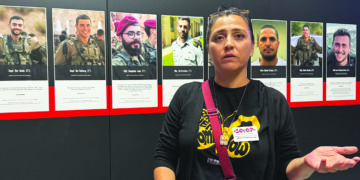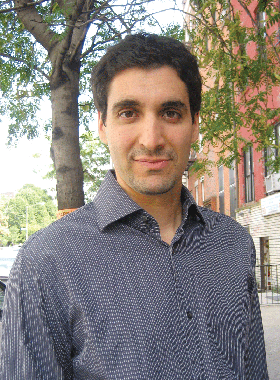When Skateboards Will Be Free: A Memoir of a Political Childhood, by Saïd Sayrafiezadeh, Dial Press, 304 pages, $22.
Reviewed by RUTH F. BRIN
In the fall of l964, Saïd Sayrafiezadeh’s parents, Martha Harris, an undergradate student of English, hoping to be a novelist like her brother, Mark Harris, the author of Bang the Drum Slowly, and her husband, Mahmoud Sayrafiezadeh, a graduate student of mathematics, attended the University of Minnesota.
They had two young children, a boy and a girl. Martha was also caring for her own mother, crippled from rheumatoid arthritis and confined to a wheelchair. One afternoon the couple stopped at a table manned by members of the Socialist Workers Party, whose central office was then in Minneapolis. They were immediately interested and took home many pamphlets and copies of the newspaper, The Militant.
Martha and Mahmoud became fanatical followers of the Socialist Workers Party and its ideas. Mahmoud had won a scholarship from his native Iran to study in the United States by winning a contest where he wrote on “What is liberty?” The author writes that the irony that his father “spent the rest of his life trying to overthrow the very government that had provided him with that scholarship is trumped by the irony that the government that had asked him to consider the idea of liberty was itself plotting to overthrow the (elected) prime minister of Iran.”
Saïd was born in the ’70s, after these events, and has early memories of his brother and sister. By the time he was four, his father had left with the two older children, but Saïd remained with his mother in Pittsburgh. It is here that this story began to remind me of Frank McCourt’s Angela’s Ashes.
Because she wants to identify with the proletariat, Martha insists on living in poverty. Saïd lacks a winter coat and is often hungry. But like McCourt he is able to find humor and satire in this situation; and while one feels angry at his mother, one has great sympathy for the little boy who finds ways to outwit her.
For example, there is the matter of the grape boycott by Cesar Chavez and the California farm workers. While his friends bring luscious bunches of grapes in their school lunches, he has none and becomes madly desirous of grapes. One day in the grocery store, he steals one from a bunch and eats it — juicy and sweet and wonderful. His mother doesn’t say anything. Then he reasons that it’s okay to steal from the capitalist oppressing grocer, so at each trip to the store, he takes a few more grapes.
Many evenings he sits sleeping or waiting under the table where his mother is distributing copies of The Militant. At monthly meetings he is known as “the little revolutionary” by the adult comrades; he sleeps or listens and absorbs the rhetoric. Although he lives near a school that is mostly white, his mother makes him take a long bus journey to a school that is mostly black. His clothes and school lunches are all much poorer than those of his black friends and he is often embarrassed, especially if he has to invite them to his apartment, which isn’t nearly as nice as theirs.
This is Sayrafiezadeh’s first book, but his writing has already appeared in magazines. His parents didn’t believe in sending their children to college, but he has managed to get the education he needs to be a good writer and to look back at his weird childhood with a mixture of humor and amazement. I’m sure you will enjoy this book. You will find it an easy read with enjoyable humor.
(American Jewish World, 9.18.09)



















